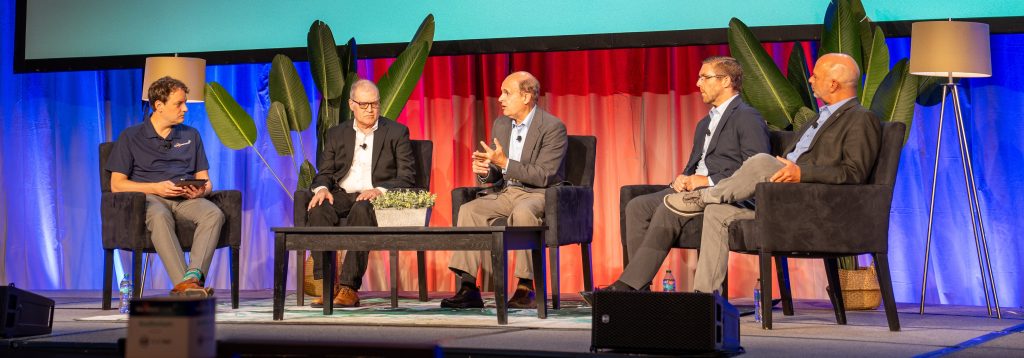Manufacturers/End Users
September 10, 2024
Steel Summit 2024: Panel highlights EV advancements and hurdles
Written by Brett Linton
A panel of automotive experts discussed the current and future state of the automotive industry at the SMU Steel Summit on Wednesday, Aug. 27, in Atlanta. The speakers weighed in on various topics surrounding the electric vehicle (EV) movement, including advancements in technology and infrastructure, consumer adaptation, and regulatory challenges.

Shown left to right in the photo above, SMU’s Michael Cowden moderated the panel, which featured Alan Amici, president and CEO of the Center for Automotive Research; Dean Kanelos, market development and product applications manager at Nucor; Dan Bowerson, VP of energy and environment at the Alliance for Automotive Innovation; and Michael Davenport, executive director and president of the Auto/Steel Partnership.
Improving costs
The group discussed improvements in EV production and costs, noting that while EVs still have a higher initial cost compared to internal combustion engine (ICE) vehicles, the premium has fallen to an average of 15%.
Amici attributed this to advancements in production technology and a decreasing supply/demand imbalance for raw materials. He explained a significant cost reduction in battery production, as battery prices have halved since the pandemic.
Panelists all anticipate that EV prices will continue to improve as technology advances further, and the cost difference between EV and ICE vehicles will even out in the not too distant future.
Consumer readiness
Panelists also addressed the challenge of balancing EV production regulations with consumer readiness. They explained that while automakers have mandates to sell a certain percentage of EVs, buyers have no such obligations.
Despite substantial investments and regulations pushing for EVs, panelists agreed that consumers are not yet ready to make the switch to fully electric cars. They cited high prices and insufficient charging infrastructure as major deterrents to buying and were in agreement that these issues will improve as technology and infrastructure advance.
“People can’t see EV chargers out there on every corner like you can see gas stations,” commented Amici. He went on to say that once people start seeing these chargers everywhere, they will start to see that “their EV trip is not that bad.”
Best of both worlds?
In a Q&A session following the discussion, panelists discussed how hybrid vehicles may be the most logical option to bridge the gap between ICE and EV vehicles. Davenport agreed that hybrid vehicles are a practical solution as EV infrastructure develops, combining the convenience of gasoline engines with the benefits of electric power.
Steel usage
Steel demand was also brought up as panelists discussed the evolving role of various materials in EV production and charging infrastructure. Kanelos explained how high-strength and electrical steels are essential for EV infrastructure, and that as the number of charging stations grows, so will the demand for those steels.
Looking ahead, the auto experts anticipate continued advancements in EV technology and infrastructure development will ultimately make EVs more accessible and convenient for buyers.







